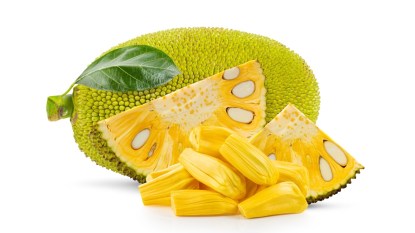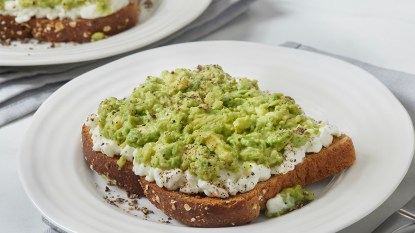The Sneaky GI Glitch That’s Wreaking Havoc on Your Thyroid
And how you can treat it.

Bile is likely something you haven’t given much thought to, but if you’re battling stubborn pounds and low energy, there’s a good chance this digestive fluid is playing a key role in your struggle.
The reason, according to research conducted at Harvard Medical School: Sluggish bile flow interferes with thyroid function.
The scientists say this disruption has to do with bile’s role in digesting dietary fats, which supply the body with the raw materials needed to produce active thyroid hormones. To better understand bile’s role in the body, Antonio Bianco, M.D., Ph.D., a member of the team that conducted the research, suggests thinking of a sink filled with dishes from a messy meal, like a pan used to cook bacon and eggs. To break down the grease and
grime in that pan, you’re going to need high-quality detergent, and that’s what bile is — it’s the liquid dishwashing detergent that breaks down dietary fats from each meal you consume so those fats can be utilized by the body.
“Digesting a meal without bile is like trying to wash a greasy pan without detergent in the sink,” explains Dr. Bianco. “It can be done, but it’s going to be really difficult.” If the body doesn’t have enough bile to break down dietary fats, the fats end up getting stored. Not only does this lead to weight gain, it also means the thyroid doesn’t get the building blocks it needs.
In fact, researchers at Tampere University Hospital in Finland found that people with reduced bile flow are seven times more likely to suffer from hypothyroidism. Dr. Bianco explains, “Our study showed that when bile is released to break down dietary fats, it triggers an increase in the production of an enzyme that converts inactive thyroid hormone [T4] into active thyroid
hormone [T3].” That’s important because T3 is the body’s main thyroid hormone responsible for firing up metabolism.
Bile’s damaging impact on the thyroid is a real concern since up
to 80 percent of women over 40 have insufficient or poor-quality bile, says holistic health expert Ann Louise Gittleman, Ph.D. Sandra Cabot, M.D., author of Your Thyroid Problems Solved, sees
it all the time: “For more than half of my patients with thyroid slowdowns, suboptimal bile health is at the root.”
Gittleman explains that as we age, everyday toxins build up in the body and become trapped in bile, making the fluid thick and
unable to flow freely. What’s more, she says, women who’ve had their gallbladders removed have no ability to regulate bile flow, so bile may not always be available when the body needs it.
For these women, Gittleman says enhancing bile health is especially important, as is talking to your doctor about an ox bile supplement (a concentrated form of bile derived from cows).
Try this One from Seeking Health: $15.97, Amazon. “This is a
must if you’ve had your gallbladder removed,” she asserts. “It can also be helpful for short-term use by those who have bile-deficiency symptoms like bloat after meals.”
The good news: Improving bile health can improve thyroid function and boost metabolism by 53 percent, the Harvard study found. “Once we get bile flowing, everything comes into
balance,” says Gittleman. Women we spoke with report thicker hair, fewer head and body aches and better mental clarity after incorporating the strategies that follow.
Optimizing bile flow revitalizes the thyroid to fire up fat burn and
rev energy — plus it provides benefits like fewer memory blips and relief from joint pain. Gittleman recommends a two-stage approach that naturally thins out congested bile and improves bile production:
Stage 1: Detox bile.
“When bile is sluggish, the first step should be making sure the bile is thinned, decongested, and fluid,” says Gittleman, who suggests following the recommendations below for five days before moving on to stage two. This will help decongest thick bile no matter what diet you follow, but for best results, she recommends sticking to a protein-rich diet including three meals and two snacks a day, and loading your plate with plenty
of vegetables while avoiding processed fats, which further clog and congest bile.
Enjoy bile-optimizing sips.
Drinking sufficient water daily is critical to thinning out bile because the digestive fluid is made up of 95 percent water. To make it easy to do, start each day with eight ounces of hot
water mixed with the juice of half a fresh lemon. “Acids in lemon
stimulate bile flow and help the liver flush the toxins and excess
estrogen that make bile thick,” explains Gittleman. Throughout
the rest of the day, sip four eight-ounce glasses of cranberry-water, which is rich in organic acids that help the body break down fats and thin out bile.
To make a day’s worth of the sip, simply mix four ounces of unsweetened cranberry juice into 28 ounces of water. Also smart: Before meals — especially those rich in carbs —
drink a mix of one tablespoon of apple cider vinegar mixed with eight ounces of water. The pantry staple contains malic acid, which Gittleman says helps to thin out bile.
Fill up on cleansing foods.
Enjoy 1 1⁄2 cups of fiber-rich vegetables (like sweet potato or parsnips) or non-gluten grains (like brown rice) daily. These foods help remove toxins and excess estrogen to thin out bile, says Gittleman.
Also try eating beets, which contain betaine, a compound known to decongest bile.
Sprinkle this on meals.
Add one tablespoon of lecithin (like Bulk Supplements Lecithin,
$13.96, Amazon) to smoothies, salads, or cereal daily. “This fatty
compound is one of the primary detergent-like agents in bile,”
explains Gittleman. “It breaks down fats so they’re easy for the
body to digest.”
Stage 2: Boost bile production.
Once bile is thinned out, Gittleman advises increasing your intake of foods that ensure the body can make more of it. For best results, add the steps below to the strategies already implemented during stage one.
Eat more saturated fat.
“Adding a couple of pats of butter or a tablespoon of cream will actually help you slim,” asserts Gittleman, who explains that saturated fats kickstart the production of bile. One of the best saturated fats: coconut oil. “It’s the only saturated fat that
does not require bile to be digested,” says Gittleman. That means it can quickly help the body improve bile production. She advises using one tablespoon of coconut oil or 1⁄2 cup of full-fat
coconut milk or cream in cooking smoothies and desserts.
Also aim to consume an additional serving of healthy saturated fats with each meal. A serving includes one tablespoon of grass-fed butter or ghee, one tablespoon of cream or a palmful of nuts.
To get the biggest benefit from coconut oil, aim to eat it in the
morning. The oil’s medium-chain fatty acids boost metabolism by 50 percent, and research suggests consuming the fat in the first four hours after waking fuels cellular energy and keeps metabolism fired up all day.
Eat protein.
Enjoy healthy protein at each meal, like three ounces of pasture-raised poultry, pork or beef (a serving the size of a deck of cards), four ounces of wild caught fatty fish or non-GMO tofu (a serving the size of a smart phone), three anchovy fillets, 20 grams of anundenatured whey or pea-and-rice protein powder, or three whole eggs. Notes Gittleman, “These picks are rich in healthy fats as well as taurine, a key component of bile.”
Incorporate bitter greens.
“Bitter flavors literally get your juices flowing by stimulating the release of bile,” explains Gittleman. “And research suggests we only need to taste them for them to be effective.” What’s more, bitter flavors have been shown to dial down sugar cravings and keep appetite in check. She advises adding one bitter food into each meal.
Grapefruit, coffee, artichokes, and even dark chocolate can be helpful, but top on your list should be fresh, in-season greens, like kale, mustard, collard, arugula, beet, chard, turnip, or watercress.
Not a fan of bitter foods? Gittleman says you’ll acquire a taste for them fairly quickly. And researchers at Purdue University say regularly eating these foods increases production of a saliva protein that binds to bitter polyphenols, enhancing the taste.
This article originally appeared in our print magazine, Heal Your Thyroid.













